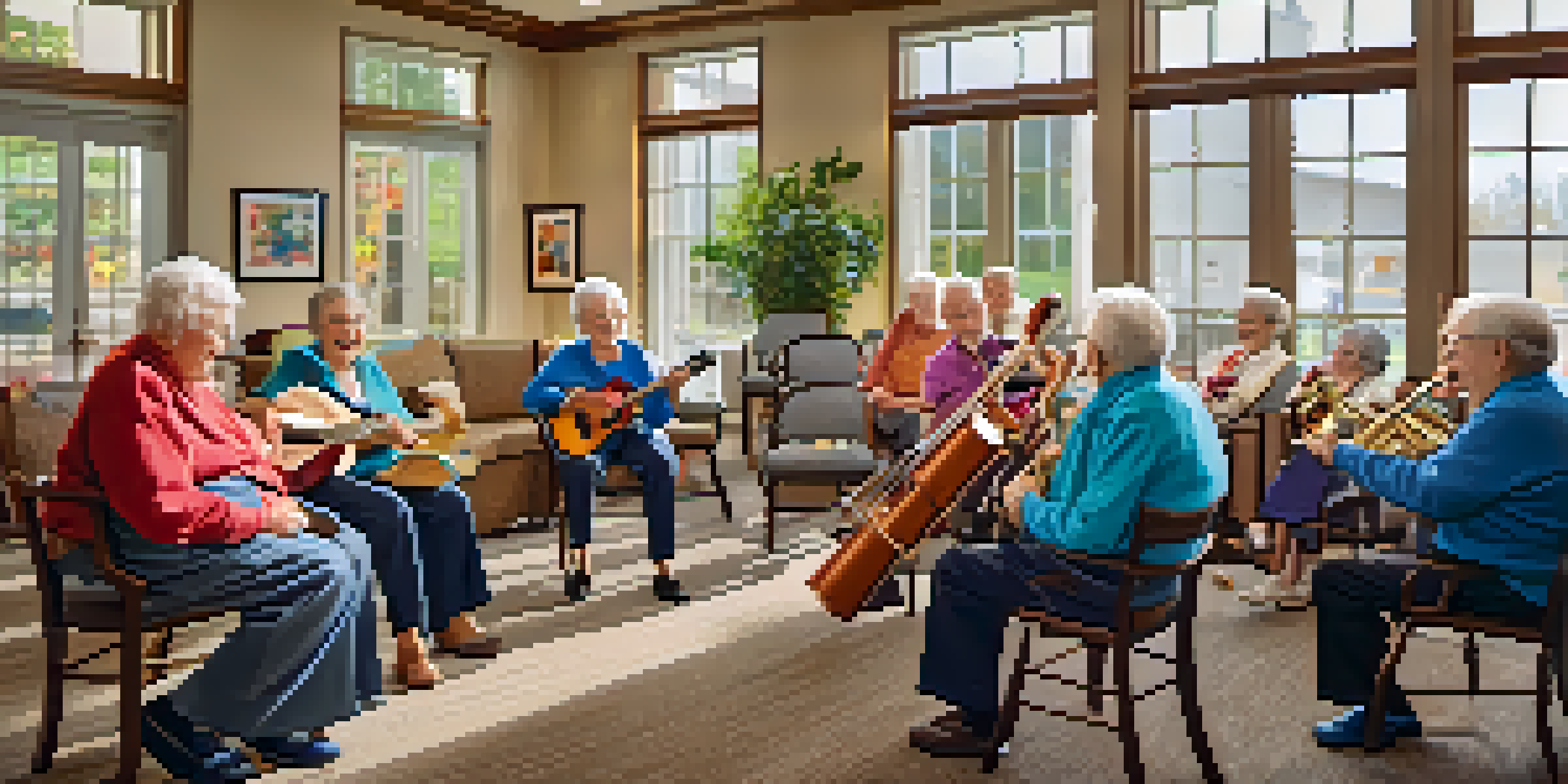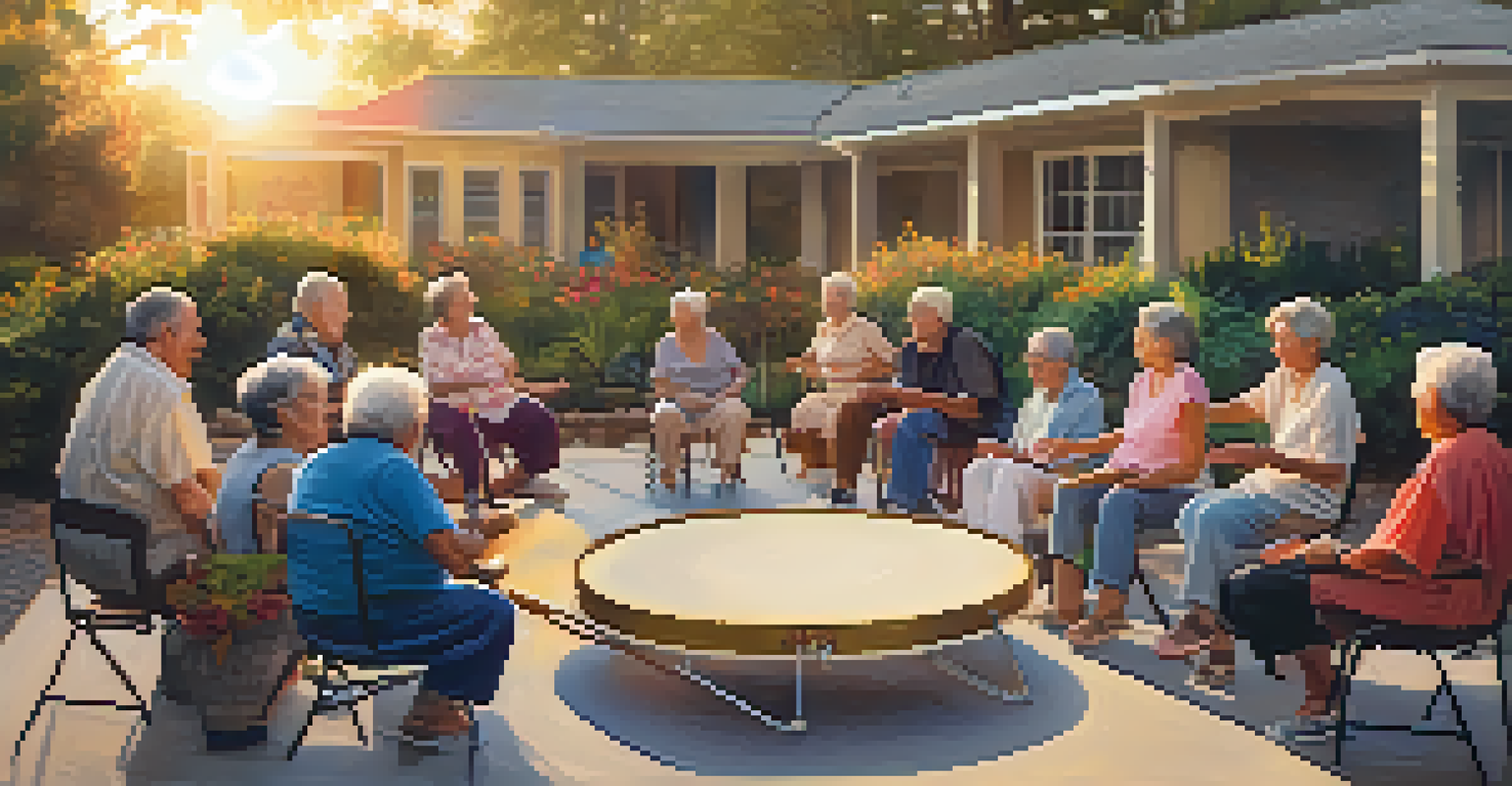The Role of Music in Facilitating Communication for Seniors

Understanding the Connection Between Music and Communication
Music has a unique ability to transcend verbal barriers, making it a valuable tool for communication, especially among seniors. As we age, cognitive functions may decline, affecting our ability to express thoughts or feelings. Music can evoke memories and emotions, often sparking conversations that might not otherwise occur. This connection allows seniors to share their experiences and feelings in a way that feels natural and engaging.
Music can change the world because it can change people.
For many older adults, music can serve as a bridge to their past, unlocking memories that can lead to meaningful discussions. Imagine a senior listening to a song from their youth; it can transport them back to a moment in time, igniting stories that they may have forgotten. This is not just about nostalgia; it’s about creating a space where they feel comfortable to communicate.
Moreover, music can simplify complex ideas. For instance, a familiar tune can help express feelings of joy, sadness, or nostalgia without the need for words. This ability to convey emotions through music can make communication more accessible and enjoyable for seniors, fostering deeper connections with their loved ones.
The Therapeutic Benefits of Music for Seniors
Music therapy is increasingly recognized for its benefits in enhancing communication among seniors, particularly those with dementia or Alzheimer’s disease. Through tailored music experiences, therapists can engage seniors in meaningful ways, helping them connect with their emotions and memories. This therapeutic approach not only aids communication but also improves overall well-being.

Consider how a familiar melody can bring a smile to someone who struggles to articulate their feelings. When we engage with music, it activates different areas of the brain, often sparking reactions even when verbal communication is challenging. This aspect of music therapy highlights its potential as a powerful tool in maintaining connections with seniors, regardless of cognitive decline.
Music Enhances Senior Communication
Music serves as a powerful tool for seniors to express themselves and connect with others, especially when verbal communication is challenging.
Additionally, group music sessions can foster social interaction, reducing feelings of isolation among seniors. Singing or playing instruments together encourages participation, leading to shared experiences that can strengthen relationships. This social component is crucial, as it helps create a sense of community and belonging.
Creating a Musical Environment for Seniors
To harness the power of music in communication, it’s important to create an inviting musical environment for seniors. This can be as simple as playing their favorite songs in common areas or hosting sing-along sessions. The key is to make music easily accessible and enjoyable, encouraging seniors to engage with it regularly.
Where words fail, music speaks.
Consider incorporating a variety of genres and styles to cater to different tastes. For instance, while some seniors may cherish classic rock, others might prefer jazz or classical music. By providing a diverse range of options, you can invite more seniors to connect with music on their terms, leading to more opportunities for communication.
Moreover, involving family members or caregivers in these musical experiences can enhance the benefits even further. When loved ones participate in music-related activities, it not only enriches the experience but also creates shared moments that can be discussed afterward, reinforcing communication.
Music as a Memory Aid for Seniors
Music can play a significant role in aiding memory recall for seniors, which is particularly beneficial for those experiencing memory loss. Research suggests that familiar tunes can trigger memories from a person’s past, acting as a cue that helps them articulate thoughts and experiences more easily. This connection between music and memory can be a game changer in facilitating communication.
For example, a senior who struggles to remember names or events might suddenly recall details when they hear a song associated with those memories. This phenomenon shows how powerful music can be in accessing parts of the brain that might otherwise remain dormant. It highlights the potential of music as a tool for enhancing cognitive function and communication.
Therapeutic Benefits of Music Therapy
Music therapy can significantly improve emotional well-being and communication for seniors, particularly those with cognitive impairments like dementia.
Incorporating music into daily routines can help create a sense of familiarity and comfort, which is crucial for seniors. By regularly engaging with music that resonates with them, they may find it easier to express themselves, leading to richer conversations with family and friends.
Engaging Seniors Through Interactive Music Activities
Interactive music activities can significantly enhance communication among seniors. These activities can range from sing-alongs and drumming circles to music-based games and performances. By actively participating in music-making, seniors are more likely to express themselves and interact with their peers, breaking down barriers that might otherwise inhibit communication.
Imagine a group of seniors gathered for a drumming session. As they follow the rhythm together, they not only connect through music but also engage in a shared experience that fosters camaraderie. This sense of unity can lead to conversations that stem from the activity, providing a natural way to communicate.
Additionally, interactive music activities can boost confidence in seniors, particularly those who may feel shy or withdrawn. As they express themselves through music, they often gain a sense of empowerment that encourages them to open up more in social settings. This increased confidence can lead to improved communication skills over time.
The Role of Technology in Music Communication for Seniors
Technology has opened up new avenues for seniors to engage with music and enhance communication. With the rise of music streaming services and apps, seniors can easily access their favorite songs and discover new music. This accessibility allows them to create personal playlists that can inspire conversations with friends and family.
For instance, a senior might use a music app to compile a playlist of songs from their youth, then share it during family gatherings. This act not only sparks memories but also encourages storytelling and sharing experiences, fostering deeper connections with loved ones. Technology thus acts as a facilitator of communication through music.
Creating Musical Environments at Home
Establishing inviting musical spaces and engaging activities can foster a sense of community and enhance interaction among seniors.
Moreover, virtual music therapy sessions have become increasingly popular, especially in light of recent global events. These online platforms enable seniors to participate in music activities from the comfort of their homes, creating opportunities for connection and engagement without the need for physical presence. This adaptability ensures that seniors can still benefit from music, regardless of their circumstances.
Celebrating the Power of Music in Senior Communities
Ultimately, the role of music in facilitating communication for seniors cannot be overstated. It serves not only as a means of expression but also as a vital tool for connection and community. By celebrating music in senior living environments, we can create spaces where individuals feel valued and heard.
Regular musical events, such as concerts or themed parties, can transform the atmosphere in senior communities and encourage participation. These events allow seniors to come together, share their love for music, and engage in conversations that might not happen in everyday interactions. It’s all about creating a vibrant community centered around the power of music.

As we continue to explore the benefits of music for seniors, it’s essential to advocate for its inclusion in care plans and community activities. By recognizing music as a critical element of communication, we can enhance the quality of life for seniors, fostering a sense of belonging and connection that resonates well beyond the notes of a song.